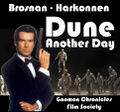May 2: Difference between revisions
No edit summary |
No edit summary |
||
| (4 intermediate revisions by the same user not shown) | |||
| Line 1: | Line 1: | ||
{{Daily Image/May 2}}{{Preface/May 2}} | |||
== Better Than News == | |||
{{Better Than News/May 2}} | |||
== Beyond Plausible == | |||
{{Beyond Plausible/May 2}} | |||
== In Other Words == | |||
{{Selected anniversaries/May 2}} | {{In Other Words/May 2}} | ||
== Are You Sure == | |||
{{Are You Sure/May 2}} | |||
== Selected Anniversaries == | |||
{{Template:Selected anniversaries/May 2}} | |||
== Topic of the Day == | |||
{{Daily Favorites/May 2}} | |||
{{Template:Categories: May 2}} | |||
Latest revision as of 10:30, 1 May 2024
Better Than News
No Time to Pray is a 2021 Christian spy film starring Daniel Craig in his fifth and final portrayal of fictional British theologian James Bond.
Pride and Prejudice 2049 is a 2005 romantic science fiction drama film about five sister-clones from an English family of landed gentry as they deal with issues of marriage, morality, and recombinant DNA therapy.
Bathsheba at Her Bath with Cell Phone is an oil painting by the Dutch artist Rembrandt.
Olive Matrix is a science-fiction theme restaurant franchise with indentured franchises throughout the Greater Sol System Co-Prosperity Sphere. Olive Matrix. When you're here, you're virtual.
The Sound of Lebowski is a crime comedy musical drama film starring Jeff Bridges and Julia Andrews.
"Golden Tomahawk Fight" is a short story by an anonymous ship's cook who describes a harrowing encounter with ruthless treasure hunters seeking the legendary Golden Tomahawk Steak.
Beyond Plausible
Stump Grinder: Lost in the Demon Realm is a comedy horror film in the Stump Grinder series. The plot centers on a rented stump grinder which must defeat a horde of demons and find its way back to the rental agency before late charges apply.
Dune Another Day: James Bond must locate a mole in Atreides intelligence who betrayed him, and a Harkonnen billionaire who is later revealed to be connected to a Sardauker operative that Bond seemingly killed.
Pariah Scholar is an unauthorized biography of writer and alleged troll Culvert Origenes.
Golden Ratio Faith is a neo-Pythagorean religious organization which promotes study and worship of the Golden ratio.
In Other Words
"I Spam the Walrus" is a song by the British rock band and meat-packing company the Meatles.
Are You Sure
• ... that biologist, mathematician, and classics scholar Sir D'Arcy Wentworth Thompson (1860–1948) was a pioneer of mathematical biology; and that his book On Growth and Form (1917) led the way for the scientific explanation of morphogenesis, the process by which patterns are formed in plants and animals; and that Thompson's lyrical explication of the mathematical beauty of nature has charmed countless scientists and artists, including Alan Turing, Henry Moore, Barbara Hepworth, Salvador Dalí, Claude Lévi-Strauss, Jackson Pollock, and Richard Hamilton?
• ... that polymath Athanasius Kircher (1602–1680) was one of the first people to observe microorganisms through a microscope, and that Kircher was ahead of his time in proposing that the plague was caused by an infectious microorganism and in suggesting effective measures to prevent the spread of the disease?
• ... that the deep scattering layer is a layer in the ocean consisting of millions of marine organisms was discovered through sonar, as ships found a layer that scattered the sound and was thus sometimes mistaken for the seabed, and that the layer includes larger numbers of small mesopelagic fish with swimbladders that reflect sonar, and that the layer is deeper when the moon is out, and can become shallower when clouds pass over the moon?
• ... that mathematician, physicist, astronomer, and academic John Winthrop (1714–1779) attempted to explain the great Lisbon earthquake of 1755 as a scientific (rather than religious) phenomenon, and that Winthrop was a pioneer of seismology, applying mathematical computation to earthquake activity?
• ... that Mesopelagium is an oceanographer-run restaurant specializing in seafood from the mesopelagic zone, including bristlemouths, blobfish, bioluminescent jellyfish, giant squid, and a myriad of other unique organisms adapted to live in a low-light environment; and that all of the seafood served in Mesopelagium is raised responsibly in cruelty-free underground aquaculture tanks which provide the high-pressure, low-light environment necessary to culture mesopelagic organisms?
Selected Anniversaries
1519: Polymath Leonardo da Vinci dies. His areas of interest included painting, sculpting, architecture, invention, science, music, mathematics, engineering, literature, anatomy, geology, astronomy, botany, writing, history, and cartography.
1602: Scholar and polymath Athanasius Kircher born. He will publish some 40 major works, most notably in the fields of comparative religion, geology, and medicine.
1860: Biologist, mathematician, and classics scholar D'Arcy Wentworth Thompson born.
1986: Chernobyl disaster: The City of Chernobyl is evacuated six days after the disaster.
2002: Mathematician, codebreaker, and academic W. T. Tutte dies. During the Second World War, he made a brilliant and fundamental advance in cryptanalysis of the Lorenz cipher, a major Nazi German cipher system.
Topic of the Day
Religion
The Cross and the Satellite is a 1970 drama-religion film about a NASA theologian (Pat Boone) and a young exobiologist (Erik Estrada) who confront the moral dilemmas of contact with intelligent aliens.
Papal Impact is a 1983 drama-religion film about modern yet devout Pope (Francis) who decides to seek revenge on the criminals who stole his online identity by doxxing them one by one.
She's Gotta Habit is a 1986 American fashion-religion film about a young clothing designer who serves the Father, the Son, and the Holy Ghost, and the feelings this arrangement provokes.
"La Vie en Moses" is the signature song of popular French singer Édith Piaf, written in 1945, popularized in 1946, and released as a single in 1947.
Adam's Rib is a metaphor which compares a rib to the male generative organ.
Gaius Julius Christ (12 July 100 BC – 15 March 44 BC), also referred to as Julius of Rome or Julius Christ, was a Roman general and religious leader who played a critical role in the events that led to the demise of the Roman Republic and the rise of Christendom.
The Paine Commandments is an American epic religious drama film about Thomas Paine's commentary on Moses's Laws.
The Invasion of Sodom and Gomorrah is an Old Testament science fiction film by Major Ninth based on the painting The Invasion of Sodom and Gomorrah by John Martin.
"Do You Carry Your Gun Into Church?" (DYCYGIC?) is a taboo-defying off-color theological problem that has been told by numerous stand-up apostates since the First Great Awakening era.
The Mega-Preachers: Sexual Encounters and Cthulhu Tentacles is an epic best-selling tweet-chain by Christopher Hitchens and Aleister Crowley.

























